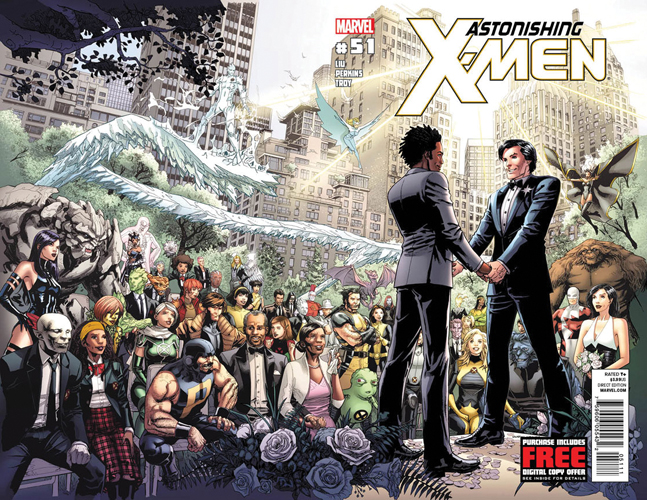DC and Marvel Comics and LGBT Growth
Last month, President Obama made the historic declaration that he supports same-sex marriage. While the effects of his statement on our culture at large are still unknown, he’s received quite a bit of press. It seems the comic book industry wants in on some of that attention.
In that same week, both DC and Marvel, the two titans of the industry, announced plans for LGBT growth in their respective universes. Marvel has confirmed rumors that out Canadian X-Man Northstar will wed his civilian boyfriend Kyle in the upcoming Astonishing X-Men # 51. Marvel editor-in-chief Axel Alonso said in an interview with Rolling Stone that “our comics are always best when they respond to and reflect developments in the real world. We’ve been doing that for decades, and this is just the latest expression of that.” Northstar, who has the powers of flight, durability, and super-speed, has been out of the closet since 1992, in a similarly news-making issue. His husband-to-be, Kyle, was introduced in 2009, and has since appeared as a supporting character.
To share in the bounty of the LGBT comic book media blitz, DC VP of publicity Courtney Simmons said, “One of the major iconic DC characters will reveal that he is gay in a storyline in June.” Later in the week, a DC writer revealed a small caveat: whoever the new member of the family is, he has not appeared in any of DC’s “New 52” comics, which have been running since September. So he may be iconic, but he’s probably not a showstopper.
So what does all of this mean for LGBT comic book characters and their readers? First, it’s a major leap forward for an industry that has long treated homosexuality as purely subtextual. As long as comic books endure, there will be a growing presence of LGBT characters for young and old readers to emulate, idolize, and, of course, pay to read. A new generation of young readers will be familiar with LGBT characters like Northstar, Batwoman, or Hulkling, making the possibility of a superhero LGBT presence in film and animation in the next 20 years more likely than ever before. We can pray that Fox’s X-Men film franchise, desperate to introduce new characters into its endless sequels, will someday feature Northstar or another gay mutant on the silver screen.
Secondly, Marvel and DC will make money this summer, but not much else will change. Northstar will get married, and then he’ll fade back into obscurity. While the plans for the character are exciting, they certainly won’t have much of an effect on the X-Men universe. Northstar is a lovely member of the team, but Wolverine he is not. What’s more, Astonishing X-Men has not been a truly relevant title in years. As for his boyfriend, Kyle, most readers will probably say “Who?” In the world of mutant genocides, cataclysmic battles, and literal apocalypses, a third-tier X-Man’s homo-sapien boyfriend of two years is not too memorable—gay or straight. As for DC, it’s safe to say that whoever comes out won’t be Clark Kent.
The deeper issue behind these publicity campaigns has to do with the industry’s tokenism politics. Of course, readers and industry members are aware that these sudden revelations and LGBT life events are not organic occurrences for the characters, but media stunts. But couldn’t they cover their tracks a little better? Network TV, which has quite a few of its own issues with minority inclusion, at least knows how to be subtle about it. What would happen if ABC advertised its 2012–2013 season with the slogan “ABC: Now with more black people!”? The issue may not be the outing of these characters, but instead their branding.
So are all LGBT comic book characters simply lifeless pawns in their company’s media barrages? Certainly not. DC and Marvel have a few characters who should be celebrated not for being gay, but for kicking ass and being gay. Greg Rucka, J.H. Williams, and W. Haden Blackman have made a lesbian Batwoman who is reckless, sexy, and unforgettably cool. In X-Factor, Peter David has developed the relationship between seismically powered Rictor and genetic übermensch Shatterstar into a complex and eloquent look into the limits of sexuality and monogamy. And Renee Montoya, also known as DC’s crime-solving “the Question” . . . forget about it.
Some day we will hopefully live in a world in which a character in a comic book or an actual person can come out without any controversy or public response. Until then, things may be blown out of proportion. Or blown up by gamma rays. Who can keep track anymore?
David Goldberg is a frequent contributor to OutSmart magazine. He also writes about gay life in Tel Aviv in this issue.











